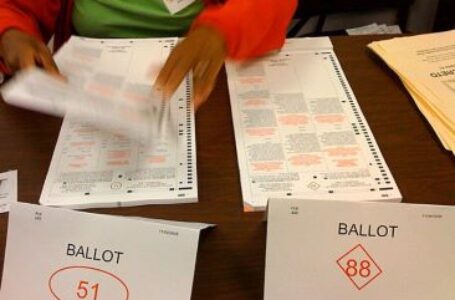In the US and UK, voter ID is just common sense

by Dan Hannan, Contributor September 02, 2021
Why do voter ID laws provoke such fevered language? Texas just upgraded its election laws, ending drive-thru voting and extending photographic checks to postal votes. These look, to the outside observer, like technical changes. Yet they led to accusations of racism, two sessions of legislative overtime, marathon hearings, a walkout by state Democrats, partisan interventions from big corporations, and the threat of arrests.
It was the same in other states. Some minor tightening of the rules in Georgia led to charges of totalitarianism, white supremacism, and fascism. I wish I could tell you that this heated vocabulary came only from excitable Twitter Lefties, but the sad truth is that it came right from the top.
“The 21st-century Jim Crow assault is real,” said President Biden in July. “It’s unrelenting.”
Seriously? Jim Crow? Jim Crow meant segregated transport, not a ban on handing out free food to voters. It meant redlining and residential apartheid, not the extension of photo ID requirements. It meant the systematic turning away of black voters through whites-only primaries and bogus literacy tests, not an extra day of early voting.
Where the U.S. leads, the U.K. tends to follow. Britain’s Conservative government is also aiming to close loopholes, bringing its rules on personation into line with those of other democracies. This, too, has triggered an almost deranged reaction. “It doesn’t matter how the government tries to dress it up,” says Cat Smith MP, Labour’s spokesman. “These plans will make it harder for working-class, older, and black, Asian, and minority ethnic Britons to vote.”
This is the same Labour Party, by the way, that backs mandatory vaccine passports. The same Labour Party, come to that, that requires ID in order to become a member.
As in the U.S., the British Left needs to tread a fine line, accusing its opponents of racism without giving the impression that minority voters are more likely to engage in fraud. This can be a delicate task in the U.K., where the worst cases of identified electoral malpractice have involved minority voters — notably in Bradford, Birmingham, and East London.
When in 2015 the then-attorney general was asked whether fraud was a particular problem in some communities, he first tried to dodge the question, saying most voters were honest and that he didn’t want to stigmatize anyone. Pushed repeatedly, he eventually conceded that multiple voting was more common “where there are high levels of inhabitants from a community in which there is a tradition of electoral corruption in their home countries,” prompting a predictable outcry and demands for his resignation.
Britain and the U.S. are outliers in their readiness to assume that voters are honest. In the U.S., this assumption is not always justified. Texas has a history of electoral fraud going back at least to Reconstruction. The second volume of Robert Caro’s stupendous LBJ biography is largely the story of how his sly subject stole the 1948 Texas senate race.
In the U.K., photo ID is currently required only in Northern Ireland, where sectarian divisions encouraged fraud — notably the practice of voting repeatedly in the names of deceased voters. The few cases of fraud in England often involve communities from regions that, like Northern Ireland, are divided along sectarian lines — notably Kashmir. It was a group of Kashmiri Labour councilors, for example, who carried out a postal vote scam in 2005, described by a judge at the time as “electoral fraud that would disgrace a banana republic.”
The judge was being unfair. I have been an election observer in two actual banana republics, namely Nicaragua and Ecuador. In neither would the Birmingham abuse have been possible because both require photo ID. Both countries had high levels of poverty and illiteracy, yet managed to ensure the integrity of the ballot without accusations of voter suppression.
Are Texans supposed to be that much dumber than Ecuadorians?
The Democrats, like Labour, claim that making the act of casting a ballot easier boosts turnout. But, if anything, the opposite is the case. A sense of ceremony makes people value something more. Having to present your credentials in person lends dignity to the act of casting a ballot which is bound to be lost in a drive-thru or a drop-box.
Dignity matters. If we want people to take the act of voting seriously, we need to elevate and ennoble it. In an age when most people care more about outcome than process and seek to overturn results they dislike, that dignity might just remind them of how lucky they are to live in a democracy in the first place.
















